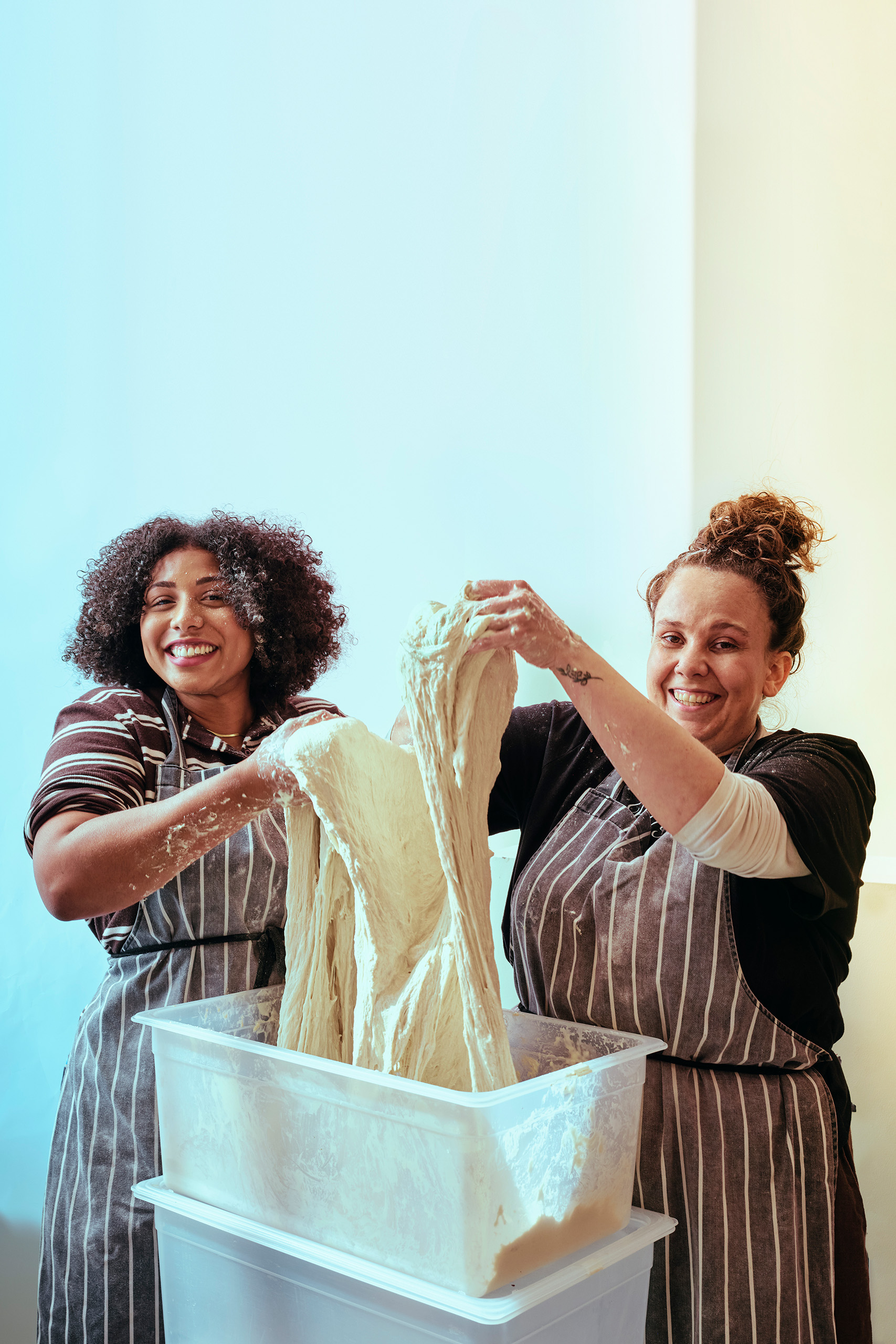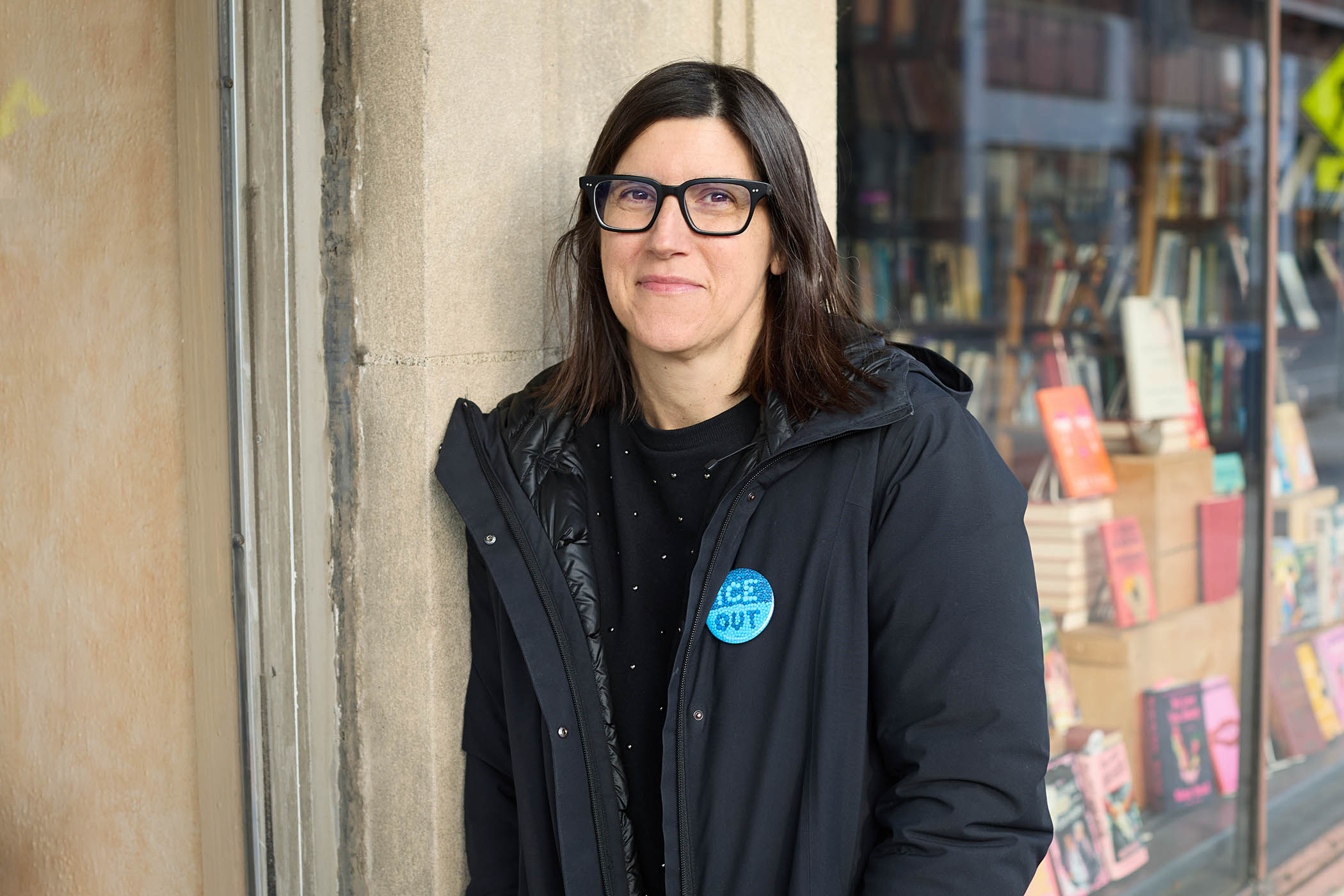Sara Assad-Mannings, Bunhead Bakery, London
I started Bunhead in lockdown, baking buns out of my dad’s house in Streatham and doing wholesale, markets and deliveries. By summer 2023 one of my best friends, Georgia Wickremeratne, and I had joined forces and found a site in Herne Hill, south-east London, opening in 2024. It was an instant success, with queues round the corner on opening day. It’s been busy ever since.
We started with five flavours, many representing different aspects of my life. There’s the classic cinnamon bun; the lemon drizzle, as my dad is British; rose, cardamom and za’atar; feta and chilli, as Mum’s from Palestine; and finally the Milo bun (my stepmum’s from New Zealand).
Buns are still the focus – that’s what people come for. They seem to be really popular, I think because they’re so versatile. We have a rotating menu of about 20. Of the sweet options, the cinnamon, rose and cardamom and baklava are some of the bestsellers. Right now, the chocolate halva bun is doing well, but the unsung hero is probably shatta and cheddar.
Most days in the bakery are split. I try to make sure people don’t have ungodly start times – we usually begin at 5.30am. The buns are sourdough (the focaccia isn’t) and we feed the starter first thing. The buns are rolled the day before and left to prove overnight, so in the morning everything goes in the oven. Around 10am, we make the dough for the next day’s buns.
The afternoon shift begins at midday, and their job is to make cakes and bun fillings, and roll the buns. We’re at our maximum capacity so we don’t bake bread, apart from focaccia, but hopefully we’ll open a second site soon.
My Palestinian heritage is very important to me and I’m not afraid to be vocal. We use Palestinian ingredients where possible and fundraise for mutual aid groups in Gaza. The bakery is vegetarian, out of convenience and respect for my audience – we get a lot of people of faith. One time a dad came in with his two kids, who were smiling at me. He said they were half Palestinian, too. To know they were happy to be somewhere that represents them was special. TM-S
Bunhead Bakery, 145 Dulwich Road, London SE24; bunheadbakery.com
Rosy Benson, Field Bakery, Somerset
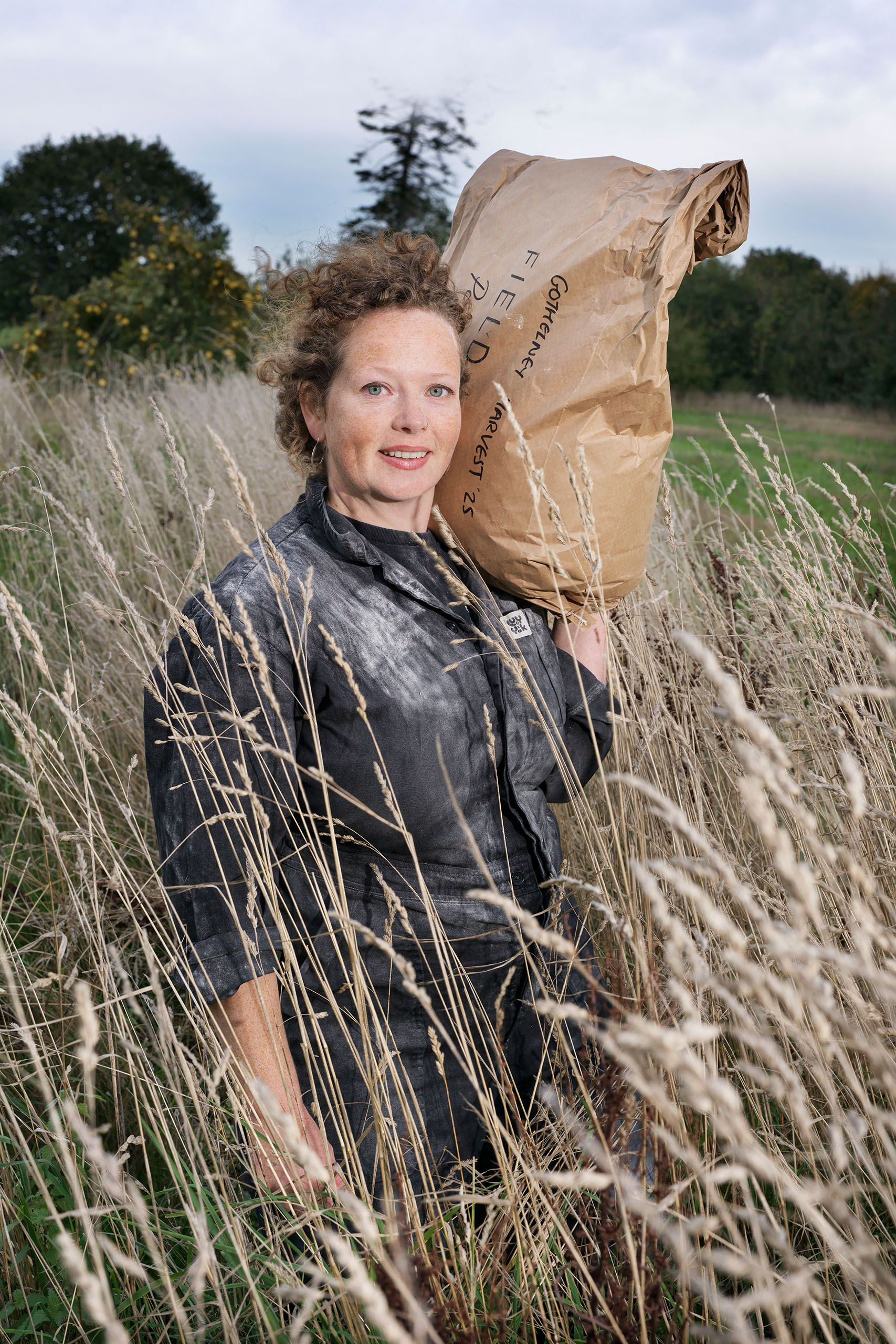
Rosy Benson of Field Bakery, photographed by Karen Robinson for OFM on Gothelney Farm in Somerset
I started the bakery at Gothelney Farm five years ago. It’s a collaboration between me and Fred Price, the farmer. We share similar values, whether to do with sustainability or good food.
Typically, flours are made from monoculture grains but we use diverse wheat populations, which I stone-mill on the farm to reduce transportation and waste, and to keep in as much of the goodness as possible. You get a lot more nutrition and a livelier flour with more flavour. It requires a certain level of skill as a baker, but it makes the food taste a lot more interesting and feel more satiating. Being on the farm has definitely made me a better baker.
‘You get a lot more nutrition and flavour by stone-milling the flour … it makes bread more interesting’
‘You get a lot more nutrition and flavour by stone-milling the flour … it makes bread more interesting’
Rosy Benson
I spend half my week at the farm and the rest of my time in Bristol, where I deliver loaves to restaurants and the Bread Club – people who’ve signed up on a subscription model. For those, it’s a classic sourdough tin loaf, which helps me fit more in the oven. I was worried at first, as people have become so used to the freeform loaf, but sourdough bread can be any shape. People are willing to pay £5.50 for a loaf because they know the origin of the flour and they’re supporting the farm’s diversity project.
Newsletters
Choose the newsletters you want to receive
View more
For information about how The Observer protects your data, read our Privacy Policy
Aside from baking, I also mill for about 10 bakeries – one in Devon takes 700kg every month – so I’m always busy. We need a lot more small mills and wheat farmers in this country, to bring more diversity into people’s bread. You can find white organic sourdough anywhere, and it’ll taste pretty similar, but by using this kind of system, my bread will taste different to the loaves of a baker in Yorkshire.
At the moment, we open to the public on Fridays and one Saturday a month, and many of the loaves are pre-ordered, which helps me know how much grain to mill. We also make pastries, such as a nice cinnamon bun with panela sugar, and a really delicate, flaky sausage roll using pork from the farm.
It’s really important the local community, who walk on the farm and see the wheat in the fields, can access what it produces. TM-S
Field Bakery, Gothelney Farm, Charlynch Road, Bridgwater TA5; fieldbakery.com
George Fuest, Populations Bakery, London
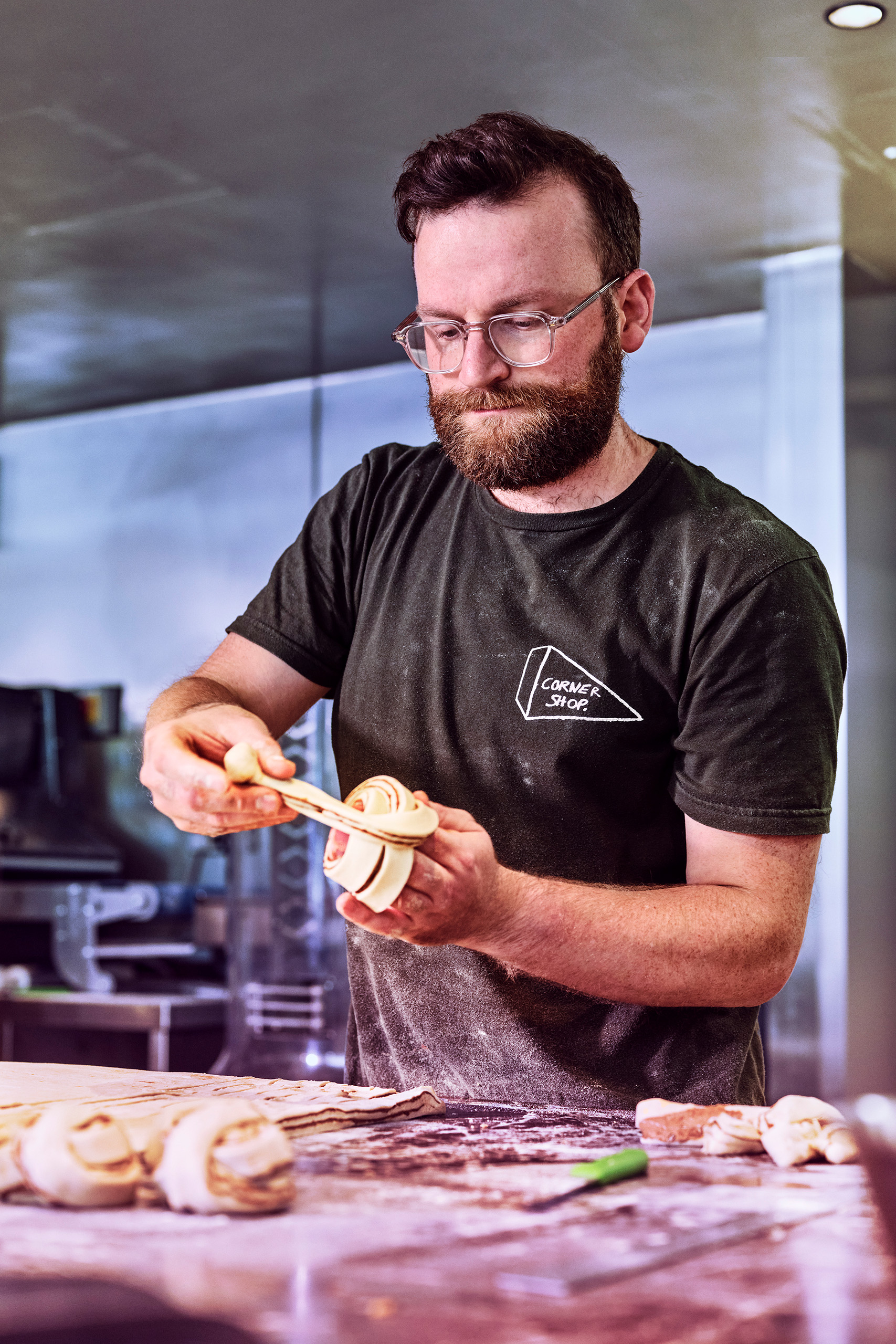
George Fuest of Populations Bakery, photographed by Phil Fisk at Corner Shop 180 in London
I started getting into baking 10 years ago when I worked as a cycle courier for Little Bread Pedlar [in south London]. It made me realise, “Wow, this is what pastries can be.” But it wasn’t until lockdown that I became obsessed – once I go down the rabbit hole on something, I get hyper-focused.
I quickly realised that I wasn’t going to be able to eat all the pastries I was making myself, so I began delivering to friends and family. I didn’t want to charge people, because I didn’t think they were quite good enough. Plus I had other projects going on – I was running a consumer advice company – so I didn’t need it to work as a business.
I did a couple of charity fundraisers (one for a social enterprise bakery in Beirut called Mavia, another for The Felix Project food bank) and was delivering pastries all around London. I was doing some pretty mega cycles, up to 80km some days – from Willesden Green to Crystal Palace and Forest Gate – and that was after an early-morning bake. My knowledge of London expanded so much, I felt like a black-cab driver.
I grew an Instagram following and soon half the deliveries were to people I didn’t know. That was really lovely, but the cycling element was pretty knackering. I started doing stages [work experience] and holiday cover at a few bakeries, including Flor in Borough Market, Toad in Peckham and Landrace in Bath. I was probably hopeless and slowed them down massively, but I really loved the experience. At Toad, I was really thrown in it: they put me straight on the laminator.
‘Fashion Week was crazy – we had a Vogue takeover at the shop and there was a queue all day long’
‘Fashion Week was crazy – we had a Vogue takeover at the shop and there was a queue all day long’
George Fuest
Last year, I was approached by the people at Corner Shop 180, off the Strand. They asked if I wanted to take over the mezzanine in their shop and offered to get me all the equipment. It was an amazing opportunity. I started developing recipes in January and we opened at the start of June to incredible demand. Fashion Week was particularly crazy. We had a Vogue takeover at the shop and there was a queue all day long.
We now have five bakers and are open seven days a week, getting in at 5am on weekdays and working through to lunchtime. I’m really keen on using heritage and population [genetically diverse] wheats and working with wholegrain flours, which can be a little more temperamental – we have to change the hydration in recipes quite regularly. But the flavour we get out of them is just incredible.
We do focaccia and bread rolls but my focus really is on viennoiserie. I’m so proud of our croissants, pains au chocolat and fruit danishes. KF
Populations Bakery is at Corner Shop 180, 7 Arundel Street, London WC2; @populations.bakery
Becky, edibles baker
Alongside my full-time corporate job, I have a bit of a side hustle: I bake edibles [food products infused with cannabis] and post them to people around the UK. I really think I’ve hit a niche. There have always been people making edibles, but as a trained pastry chef – my previous career – the quality of what I make is very high and there’s huge demand. Whenever I put anything up on my website, I sell out within the hour.
I discovered edibles while studying in the US – it’s a bit more lenient over there. I’ve always loved baking so it was a natural progression, especially living in dorms where you’re not supposed to smoke – it was a lot easier to bake the weed into brownies and consume it that way. You get more bang for your buck as well. For a long time I made edibles for my friends. Then, during lockdown when I was furloughed from my restaurant job, I made a weed-infused birthday cake and a couple of people asked for my details. It all snowballed from there.
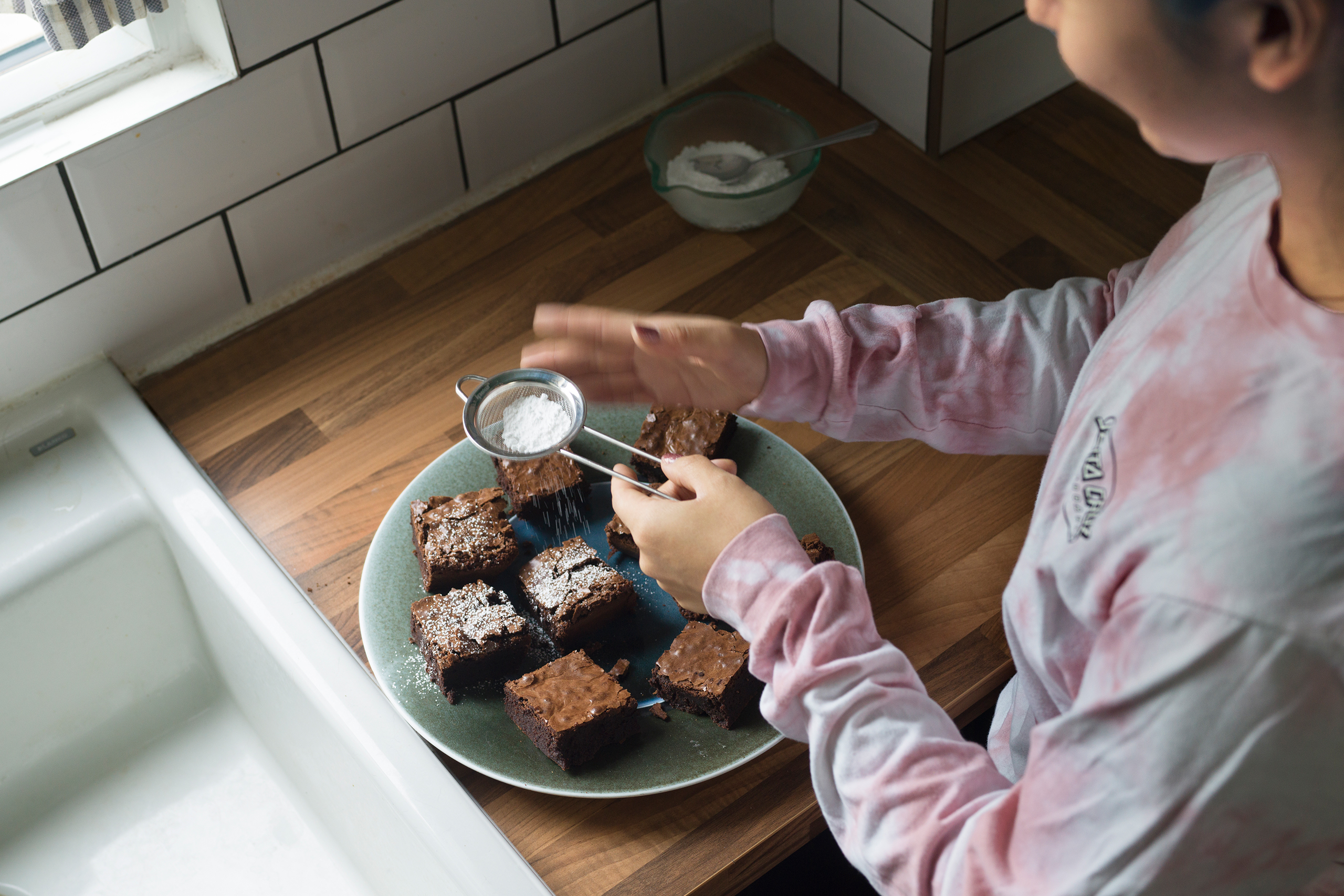
Becky, photographed at home by Pål Hansen for OFM
‘The quality of my edibles is very high. Whenever I put them on my website, I sell out within the hour’
‘The quality of my edibles is very high. Whenever I put them on my website, I sell out within the hour’
Becky
Gummies are always the most popular product because they’re so easy to take anywhere, whereas baked goods are more perishable. But I have a few classics that are always on my menu: brownies, shortbread, cookies. It has to be something that can withstand the postage, so no fresh cream or anything like that. I do sometimes get requests for birthday or wedding cakes with weed, which I’m happy to do.
My biggest gripe with edibles in the US is how strong they always are – you could never eat the whole cookie without getting stoned out of your mind. I make my baked goods quite low-dosage, so you can eat the entire thing in one sitting. That helps with the taste as well: because it’s less strong, it means it’s not going to taste as grassy. So it’s a triple whammy in that I’m using good ingredients, I know what I’m doing – baking is all about precision – and I’m making them lower dose so that they don’t taste disgusting.
I spend three to four hours a week making edibles. I’m lucky enough to own my flat, and I live by myself, so I can do everything here. I sell through an ecommerce website and ship all over the UK. People have to DM me on social media to get the password.
If weed became legal tomorrow, I’d certainly be tempted to do this full time. KF
Name has been changed
